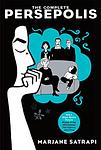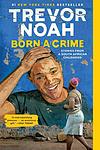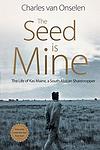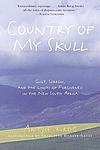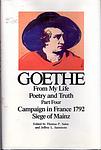The Greatest Iranian, South African "Nonfiction" Books Since 1980
Click to learn how this list is calculated.
This list represents a comprehensive and trusted collection of the greatest books. Developed through a specialized algorithm, it brings together 300 'best of' book lists to form a definitive guide to the world's most acclaimed books. For those interested in how these books are chosen, additional details can be found on the rankings page.
Genres
Countries
Date Range
Reading Statistics
Click the button below to see how many of these books you've read!
Download
If you're interested in downloading this list as a CSV file for use in a spreadsheet application, you can easily do so by clicking the button below. Please note that to ensure a manageable file size and faster download, the CSV will include details for only the first 500 books.
Download-
1. Persepolis by Marjane Satrapi
This graphic novel is a memoir that provides a personal account of the author's childhood and young adult years in Iran during and after the Islamic revolution. The story portrays the impact of war, political upheaval, and religious extremism on ordinary people, while also exploring themes of identity, resilience, and the power of storytelling. Despite the harsh realities the protagonist faces, the narrative also includes moments of humor and warmth, providing a nuanced view of life in Iran during this tumultuous period.
-
2. Long Walk To Freedom by Nelson Mandela
"Long Walk to Freedom" is a powerful autobiography that chronicles the extraordinary life of Nelson Mandela. From his humble beginnings in a rural village to becoming the first black president of South Africa, Mandela's journey is one of resilience, determination, and unwavering commitment to justice and equality. Through his personal experiences, he provides a vivid account of the struggle against apartheid, his 27 years of imprisonment, and the eventual triumph of democracy. This book serves as an inspiring testament to Mandela's unwavering spirit and his lifelong fight for freedom and human rights.
-
3. Persepolis Two by Marjane Satrapi
This graphic novel continues the story of a young girl growing up in Iran during the Islamic Revolution. After being sent to Europe for her safety, she struggles with feeling out of place and longs for her homeland. Eventually, she returns to Iran, only to find it vastly different from the place she remembered. The book explores themes of identity, culture, and the effects of political upheaval on a personal level.
-
4. Kaffir Boy by Mark Mathabane
This autobiography tells the story of a young boy growing up in apartheid-era South Africa. Despite enduring extreme poverty, brutal police raids, and constant racial discrimination, the protagonist manages to escape his harsh reality through education and tennis. His determination and resilience eventually lead him to receive a scholarship to an American university, providing him a chance to escape the oppressive system of apartheid.
-
5. Reading Lolita in Tehran by Azar Nafisi
The book is a memoir that takes place in Iran from 1979 to 1997, during the Islamic Revolution and the Iran-Iraq War. The story focuses on a professor who secretly gathers seven of her most committed female students to read forbidden Western literature in her home. As they read and discuss works by authors such as F. Scott Fitzgerald, Jane Austen, and Vladimir Nabokov, they explore their personal dreams and the losses they suffered due to the political, social, and cultural climate of the time.
-
6. Daughter Of Persia: A Woman's Journey From Her Father's Harem Through The Islamic Revolution by Sattareh Farman-Farmaian
This memoir recounts the extraordinary life of a woman born into a privileged family in early 20th-century Iran, who witnessed the dramatic shifts of her country's social and political landscape. Growing up in a polygamous household, she broke with tradition to pursue an education abroad, later returning to Iran to become a pioneering advocate for social reform and women's rights. Her story spans the rise and fall of the Pahlavi dynasty, the advent of the Islamic Revolution, and her subsequent exile, offering a personal lens on Iran's complex history and the role of women within it. Through her journey, she embodies the struggles and resilience of a nation in the face of modernity and change.
-
7. Funny in Farsi by Firoozeh Dumas
This memoir tells the story of an Iranian family who migrated to America in the 1970s, offering a humorous take on their experiences. The narrative focuses on the author's childhood and adolescence, exploring themes of cultural identity, assimilation, and the immigrant experience in America. It highlights the family's journey of navigating a new country and culture, while still holding on to their Iranian roots. The book showcases the author's ability to find humor in the most challenging situations, making it a heartwarming and amusing read.
-
8. Born A Crime by Trevor Noah
"Born A Crime" is a captivating memoir that chronicles the life of Trevor Noah, a South African comedian and television host. Set during the apartheid era, the book explores Noah's experiences as a mixed-race child growing up in a society where interracial relationships were illegal. With humor and insight, Noah recounts his struggles with identity, poverty, and racism, while also highlighting the resilience and strength of his mother who played a pivotal role in his life. This thought-provoking memoir offers a compelling and personal perspective on race, family, and the power of laughter in the face of adversity.
-
9. The Seed Is Mine by Charles Van Onselen
"The Seed Is Mine" is a historical non-fiction book that explores the life of a black South African named Klaas, who lived through the tumultuous years of apartheid. Through extensive research and interviews, the author delves into Klaas' personal experiences, struggles, and aspirations, shedding light on the complex dynamics of race, class, and power during this period. The book offers a poignant and intimate portrayal of one man's fight for dignity and justice amidst a system designed to suppress and oppress.
-
10. Country Of My Skull by Antjie Krog
"Country Of My Skull" is a powerful and deeply personal account of the author's experiences as a journalist covering the Truth and Reconciliation Commission in post-apartheid South Africa. Through her vivid and introspective narrative, the author explores the complexities of forgiveness, justice, and the collective healing process of a nation grappling with its painful past. This thought-provoking book offers a unique perspective on the complexities of reconciliation and the enduring impact of trauma on individuals and societies.
-
11. Boyhood: Scenes from provincial life by J M Coetzee
"Boyhood: Scenes from Provincial Life" is a semi-autobiographical novel that explores the author's childhood in South Africa during the apartheid era. The narrative delves into the complexities of family dynamics, racial tension, and the struggle of a young boy trying to understand his place in a divided society. The protagonist grapples with his identity, torn between his Afrikaner heritage and his English schooling, while also navigating the trials of adolescence. The book offers a poignant and often painful reflection on the formative years of a boy growing up in a fraught and turbulent time.
Reading Statistics
Click the button below to see how many of these books you've read!
Download
If you're interested in downloading this list as a CSV file for use in a spreadsheet application, you can easily do so by clicking the button below. Please note that to ensure a manageable file size and faster download, the CSV will include details for only the first 500 books.
Download

